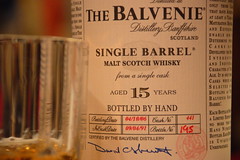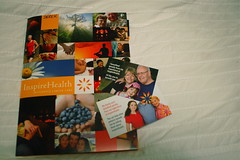Penmachine
25 December 2008
A Christmas toast to Martin and James
 It's been a busy Christmas, made busier by enough snow to nearly paralyze a usually not-very-snowy city like Vancouver. Yet my wife, daughters, and I were able to pilot our snow-tire-equipped Toyota Echo through the wilds of East Vancouver to my aunt and uncle's house for our traditional family Christmas Eve event. We did have to bunk out there overnight, though.
It's been a busy Christmas, made busier by enough snow to nearly paralyze a usually not-very-snowy city like Vancouver. Yet my wife, daughters, and I were able to pilot our snow-tire-equipped Toyota Echo through the wilds of East Vancouver to my aunt and uncle's house for our traditional family Christmas Eve event. We did have to bunk out there overnight, though.
Today, Christmas Day, we made it home, cleaned up, changed, unpacked, and then ventured out to Maple Ridge for a quiet dinner with my wife's parents. The roads by then were better. Besides eating, I performed some of the usual in-laws' tech support to help my father-in-law configure their new Internet Wi-Fi radio set, and my mother-in-law create her first blog. (No content yet, so a link must wait.) With more snow forecast, we made an early night of it and returned to Burnaby again, and Christmas was complete.
Now, as the day ends, I think back not only on Christmas and my happiness at being relatively healthy again this year (tumours in my lungs are still growing, but very slowly, and maybe my new holistic health approach is assisting the cediranib in keeping them somewhat at bay), but also about the deaths of two people. They were my friend Martin Sikes, who died suddenly a year ago on the morning of Christmas Eve, after sending me what turned out to be a spooky email; and James Brown, who appropriately, somehow chose the most bombastic of days, December 25, to make his last fleet-footed shuffle off the stage.
From now on, to me, December 24 will also be Martin Day, and December 25 is JB Day. In their honour, I'm drinking my first glass of The Balvenie 15-year-old scotch whisky tonight, from a bottle given to me on my birthday in 2007 by Alistair—but which I have only now opened.
I hear the plow truck finally making a pass through our street outside, near midnight. I am exhausted, and content. Slàinte to MS and JB, and Merry Christmas to you.
Labels: cancer, chemotherapy, death, driving, holiday, inspirehealth, martinsikes, music, vancouver, weather
02 December 2008
Taking charge of cancer treatment
 Last week my wife and I attended a two day "life enhancing seminar" at Inspire Health, an unusual cancer-treatment facility in the Fairview area of Vancouver. It is indeed an inspiring place, and an unusual one.
Last week my wife and I attended a two day "life enhancing seminar" at Inspire Health, an unusual cancer-treatment facility in the Fairview area of Vancouver. It is indeed an inspiring place, and an unusual one.
Inspire Health (formerly the Centre for Integrated Healing, and now ten years old) advertises itself as "integrated cancer care," and what that means is that they take a whole-person approach to battling and living with the disease. There are several medical doctors there, whose consultations—the first one is 90 minutes long!—are covered by the regular B.C. Medical Services Plan (and so don't cost me any money). But there are also many complementary treatments such as acupuncture and massage available (for a fee, as elsewhere in the province), in addition to a whole bunch of supportive resources in the form of free yoga and meditation classes, a resource library, and so on.
The seminar itself costs some money, and is a sort of boot-camp introduction to the centre's philosophy, with numerous speakers over two long days. It's difficult to summarize, but the nub of it is to help patients like me take control of our health and treatment. That's a change for me. It's not that I've been timid about my cancer care over the past two years—but I have been pretty passive until recently. I simply lined up and took whatever my doctors could throw at me to try to destroy the tumours in my body, and suffered whatever pain and side effects that entailed. Here's what I wrote in March:
...The basic choice has been: Treatment or death? Yes or no? That's a pretty easy decision. My real choices have been pretty small...
The choice is no longer so stark, because the conventional treatments I'm taking now (like Cediranib) are more investigational, and I have to weigh their benefits and disadvantages more explicitly. Inspire Health is designed to help me make the more complicated decisions that come now, and to get me eating better, exercising more, relaxing effectively, and overall feeling better—all of which may assist in reducing the effect of cancer on my health, and will certainly help minimize the side effects from the treatments I decide to pursue.
Based on medical advice well supported by good research, I'm already taking some useful (and extremely non-bizarre) vitamins and supplements, and we've started eating more organic and whole foods, as well as improving our family's nutrition generally, which can only be for the good. I'm getting out for a brisk walk pretty much every day, even in the nasty weather, and instead of buying a coffee I'm often getting one of those bizarre-looking but surprisingly good-tasting carrot-spinach-beet–type fresh juices at the mall. A couple of days ago I attended my first-ever yoga class at Inspire Health, and though it was a beginner's session and very slow and gentle, it was also surprisingly strenuous. I'll be going back next week.
What's perhaps most unusual about Inspire Health is the nature of the space itself. While it is in many ways a medical office, it looks, feels, sounds, and smells nothing like one. It's decorated in subtle earth tones, with plenty of art. The hallways curve subtly. The lighting is gentle and incandescent. The furniture is soft and comfortable. It smells like warm spices and tea. It's relaxing, not stressful. As you might expect from my description, there's a certain new-agey granola vibe, which as a hard-brained science-dude rationalist I have to work to avoid being a bit cynical about.
But it works. I recommend that any cancer patient in the Vancouver area try it out—we're lucky to have it, because it's one of the only facilities of its kind in North America. Go there, for a doctor's appointment or a seminar or a yoga class, and you feel better just walking in, which is a big contrast to any other medical facility I've ever visited. And there are a lot of smart people associated with the place. Will all this stuff slow or stop my cancer? I don't know. But I'm already feeling better, no matter what else happens.
Labels: cancer, chemotherapy, inspirehealth, joy, vancouver
25 October 2008
The living part
 I think some of you might have garnered the wrong impression from my previous entry. I'm not giving up on conventional cancer treatment, nor am I resigned to dying soon. Rather, I'm considering my choices more carefully, trying some new things, and making a stronger cost-benefit analysis of the options presented to me.
I think some of you might have garnered the wrong impression from my previous entry. I'm not giving up on conventional cancer treatment, nor am I resigned to dying soon. Rather, I'm considering my choices more carefully, trying some new things, and making a stronger cost-benefit analysis of the options presented to me.
Until September, the conventional treatments I'd been taking—chemotherapy, radiation, surgery—still showed reasonable promise of putting my cancer into remission, or shrinking it, or even (before we knew it had metastasized into my lungs) curing it. So it was worth trying everything, side effects and life-on-hold be damned. The surgery worked its magic: if the cancer cells hadn't found their way to my lungs first, I might very well be cancer-free by now from the skilled work of Dr. Phang and his team at St. Paul's Hospital. The radiation I'd had before that might even have helped.
But the chemo...well, those various poisons I've taken in 2007 and 2008 may very well have kept any further cancer from appearing in my intestines, but the tumours in my lungs are tough little fuckers, and have resisted being beaten down. Now I have to look at the new treatments I might have coming up, and decide whether their relatively low likelihood of zapping those same malfunctioning blobs of tissue are worth what I might have to suffer in taking them.
I mean, it's fine and noble to help cancer research, but I've already done that a couple of times. I might still do it this time, but even if I do, I'm prepared to bail out early if the side effects are too harsh or if it doesn't seem to be helping. I'm also meeting with a doctor at Inspire Health next Friday to talk about other stuff: nutrition, exercise, relaxation, complementary treatments, and so on.
This is a new phase of how I understand my disease, and how my family and I live with it, one I feel good about because I'm putting a priority on the living part.
Labels: cancer, chemotherapy, death, family, inspirehealth, science, surgery
23 October 2008
To fight, or to live
 My wife Air is wiser than me—more self-aware, better at thinking long term. A big reason I'm not that way is because, until I developed cancer at the beginning of last year, I'd never had to face big, difficult decisions. I had a happy, stable childhood, did well in school, lucked into good jobs, and found her. (More accurately, she found me. See what I mean?)
My wife Air is wiser than me—more self-aware, better at thinking long term. A big reason I'm not that way is because, until I developed cancer at the beginning of last year, I'd never had to face big, difficult decisions. I had a happy, stable childhood, did well in school, lucked into good jobs, and found her. (More accurately, she found me. See what I mean?)
Even after my cancer diagnosis, I've followed the path I've usually chosen in life. That is, I've coasted, and let gravity take me where it will. My treatment decisions have been easy ones. Follow doctors' orders. Get tests, have surgery, take chemotherapy and radiation, more tests, more surgery, more chemo, more chemicals, more treatments, coming up on two years' worth now.
On hold
The surgeries in my intestines were successful, but small nodules of cancer spread to my lungs anyway, and the chemical medicines for those haven't worked so well. The metastases continue to grow slowly, regardless of what my doctors have thrown at them.
My latest surgery a couple of weeks ago was my first that wasn't about attacking the cancer. It was simply to make my life better, to reconnect my intestines so that I'm no longer walking around with an ileostomy bag of poop glued to my belly. Now I have another new, healing scar, and I'm re-learning how to use the bathroom the way I used to.
That surgery prompted my wife to have a talk with me a couple of days ago. With her wisdom, and her insight, she's seen what I've been doing in my mind for the past couple of years. I've been treating my cancer as something to fight with everything the doctors and nurses can offer, no matter how sick they make me, hoping that one of those weapons will kill it so I can move on with my life. I've put my life on hold—and my family's life too, hers and our daughters'—to fight the disease, treating it as a phase to get through before I return to something normal.
Experiment, not treatment
Except that's not how it's going. The next treatment the B.C. Cancer Agency is offering me is a Phase I clinical trial of chemotherapy agents. That means it's a very early human test of the drugs involved, not even designed to find out whether the drugs work to fight cancer, but rather how patients like me respond to them—what levels they appear at in my bloodstream, how they interact, what side effects they produce. In other words, we've run out of the conventional therapies, and we're moving on to experimental ones that have a very small chance of working. They are, however, likely to produce side effects, even if they aren't effective in shrinking my cancer.
Air made me ask myself—after almost two years on hold, most of which I've spent hammered down by those side effects, or recovering from surgery—how I want to live my life with cancer. Because that's what it looks like I'll have to do. We don't know how long that will be: months certainly, years quite possibly. All indications are that, like my diabetes, I'll have cancer for the rest of my life. It will probably be what kills me, whenever that is.
Yet since I stopped my last chemo treatments in September, I've felt good, verging on healthy, better than I have in ages. Therefore, much of what I've suffered through, especially recently, has been from the treatments, not from the disease. I thought that suffering was a necessary part of the fight. So I thought. But now it's time to make some real decisions.
Real decisions
Do I want to be part of this new Phase I trial, to contribute semi-altruistically to cancer research, spending many days at the Cancer Agency getting tests, taking pills every day, maybe feeling sick all the time and getting more strange skin rashes, perhaps even developing other weird side effects like elevated blood pressure, maybe for no reason that might actually get me better?
Or do I want to look at something else, like Vancouver's Inspire Health Integrated Cancer Care, and the Callanish Retreats, to try different things and look at managing cancer instead of fighting it? Strange as it sounds, should I make cancer part of how I live my life, rather than something that stops me from living it?
When I heard about the trial yesterday, I assumed, almost unconsciously, that I'd proceed with it. But that's still coasting, just taking whatever the doctors serve up from a diminishing buffet. There are places I still want to go in my life, things I want to do, the husband and father I still want to be. Perhaps now is the time to go there, to do them, to be that, because I can't wait forever first.
I shouldn't waste my life trying win a fight that likely can't be won. I should take it off hold, and live it.
Labels: cancer, chemotherapy, death, family, ileostomy, inspirehealth, love, science, surgery, travel